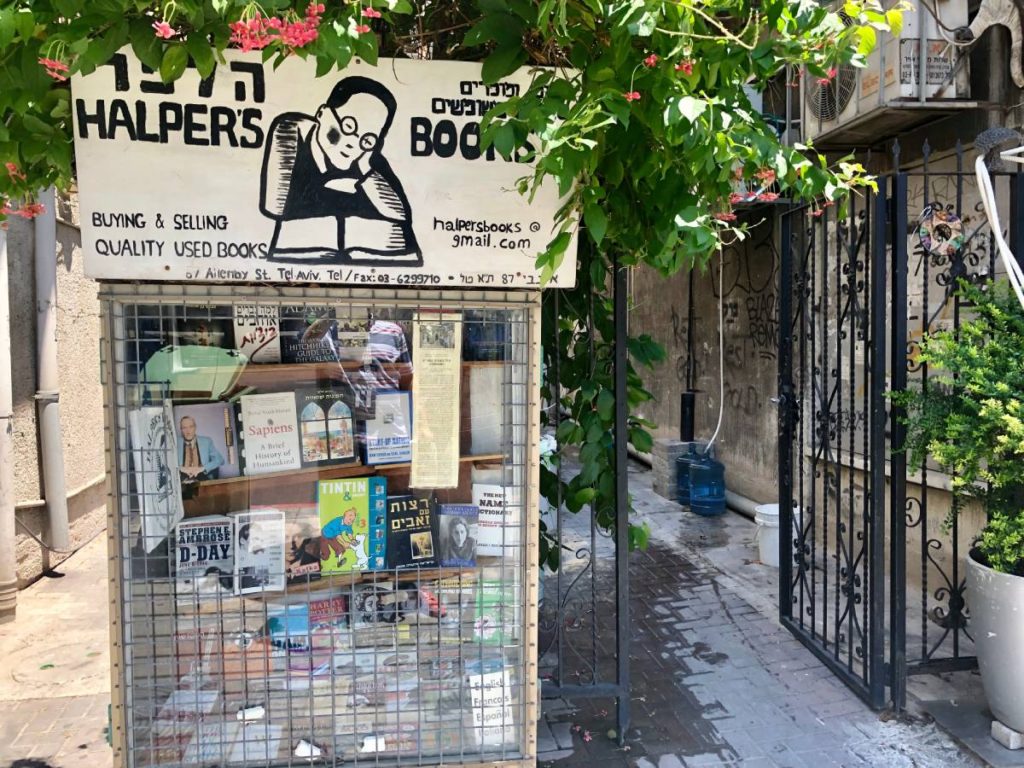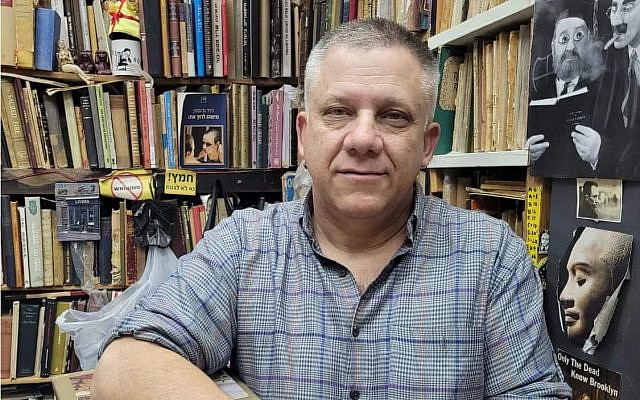Crossposted on my Times of Israel blog.
There are more than 60,000 titles for sale at Halper’s Books, a labyrinthine store on Allenby Street in Tel Aviv. Most of the inventory is used, but a couple of weeks ago, a brand new book appeared on proprietor Yosef Halper’s front table: his own.
“The Bibliomaniacs: Tales from a Tel Aviv Bookseller” is Yosef’s first collection of short stories, and the first to be published by Locus, a boutique Israeli publisher, in English. The 19 stories are fictionalized accounts of his dealings with real customers who have found their way into his shop over the past 31 years.
There’s Julian, an alcoholic Brit who likes true crime; Hyman, an octogenarian music teacher from Cleveland who behaves “like a hormonal preteen let loose in a strange city with limitless cash”; Geraldine, a Yiddish-speaking caregiver from the Philippines; Rabbi S., a Talmudic scholar from Bnei Brak with a “weakness” for detective novels; Reuven, a native New Yorker who believes he’s the messiah; and many other colorful characters.
Born outside Newark, New Jersey, Yosef made aliyah in 1983. (His birth name is James Charles Halper, which is partly why he chose the pen name “J.C.” It’s also a wink at a certain first-century Jew from Nazareth.) During the four years I lived in Tel Aviv, I made frequent visits to Halper’s Books and got to know Yosef. I called him up recently to chat about “The Bibliomaniacs,” which is very entertaining and reveals that running a secondhand bookstore in Israel is far from a mundane job. (Read an excerpt here; buy the book from Locus, AbeBooks, or, for a discount on shipping, directly from Yosef.)
Our conversation—interspersed with passages from the book—has been lightly edited for clarity.
What is a bibliomaniac?
Yosef Halper: There are book lovers and book readers, but a bibliomaniac is an obsessive collector of books. He has no hope of ever reading everything he has. He has to continue the hunt—the hunt is what gives him joy.
One hears a lot of stories in a place where stories are sold.

Why did you decide to write these stories?
I like telling jokes and stories, and I always wanted to write but I never felt that I was capable. My friend, who’s Israel’s ambassador to South Korea today, Akiva Tor, was in a writing group led by Dalia Rosenfeld. So I joined the group on a whim, and I kind of caught the fever. Once I started writing, I saw that I enjoyed it. I needed a group to bounce my stories off of because I wasn’t sure if what I was writing was acceptable or good or entertaining.
I have an innate tendency, perhaps it is a fault, to let people lie to me.
The characters in your stories are based on real people. Why do you think so many eccentric, even unstable people have gravitated toward you and your store over the years?
I’m interested in people. I’m drawn to them and allow them to take root in my store. I also don’t have the heart to get rid of people who are down on their luck. I don’t have the heart to kick them out. I would just give them a job, and then of course there would be a big falling out, like with Julian [the alcoholic Brit]. But I’m much more circumspect these days about it. I’m less enthusiastic about letting cuckoos settle in the shop.
Allenby is the one thoroughfare in Israel that most resembles lower Broadway in New York City. It is a long, wide, bus-congested artery of urban noise, schmootz, and general blight, but also a magnet for the off-color and unusual folks from throughout the country and even the world. I felt right at home there.
In “A Bottle of Dimple,” there’s a lovely description of Allenby. How much do you credit your store’s location for providing you with such rich material for your stories?
If I were in North Tel Aviv, it would have been different. There wouldn’t be bums, there wouldn’t be the drug addicts, the prostitutes. You can disappear on Allenby Street more than any other street in the country. The only other place would be Jerusalem, but that’s a whole different vibe over there. That’s where you get the religious crazies.

The narrator (also named Yosef) mentions that a couple met and later got engaged in his store. Has that happened in real life?
I know of at least three couples who met in my store and a relationship developed, but I’m sure there are many more. It’s a very intimate place. The aisles are very tight. It’s claustrophobic, somewhat, but relationships have evolved from it.
The opposite is true, too. One customer of mine is a bus driver and he’s also an amateur military historian. He married a woman that he met on the bus. He was buying books and hiding them under the bed, and that was one of their sources of friction. She was upset that he was wasting money on books and hoarding them. They eventually got divorced.
“Let’s get something straight between us, kid. I don’t care where you went to college and how much of a smartass you are, you will never know… truly know… how this country really works, ever.”
One of the themes that emerges in the book is how challenging it can be for expats to navigate life in Israel, especially if they don’t have a support network. Were you trying to shine a light on that?
I don’t know if I was intentionally shining a light, but once I read through the stories as a group, I saw that that was indeed the thread running through them. It can be very harsh if you don’t have a family and a social system that supports you. You can wind up on the streets. These stories are both tragic and funny, and that’s how I view life, as a tragic-comic situation.
How do you explain your own success in Israel?
I made aliyah in ’83, and I said to myself, “No matter what they throw at me, I’m going to stay here. No matter what kind of shit I’m going to have to eat here, I’m going to stick it through and pretend that I don’t have a choice. I’m going to pretend I’m a refugee from the Soviet Union or a Holocaust survivor that has nowhere else to go, and I’m going to ride out whatever they throw at me.”
I took things one year at a time. That’s how I did it. And you build up friendships. It was very hard and I sacrificed a lot to be here. I’m from a huge family and I missed out on all the family events in the States, but I was kind of ideological. Now I’m at a place where I have grandchildren. I can’t leave even if I wanted to.
This was my vision of paradise, to be surrounded by books in an intellectual atmosphere of reading and conversation.
What do you like most about running your shop?
The best part is the interaction with customers. I was thanked by people over the years. One guy became a judge and he thanked me one day. He attributes his love for law to me having provided books that he was drawn to, specifically John Grisham novels.
That’s kind of a mission that I have, not just to sell and make a living but to provide things in Israel that wouldn’t be available to people if I didn’t provide it to them.




